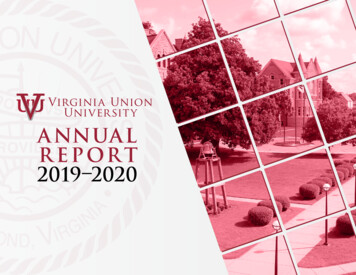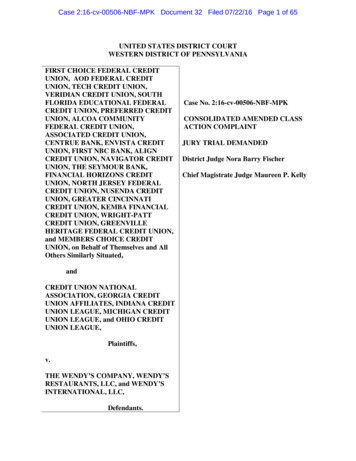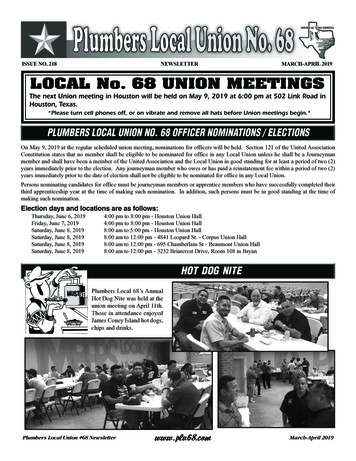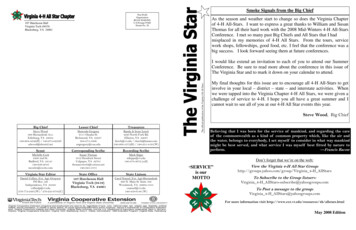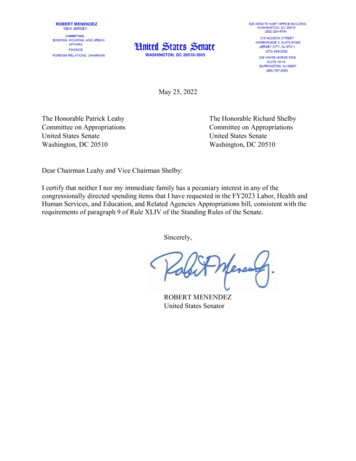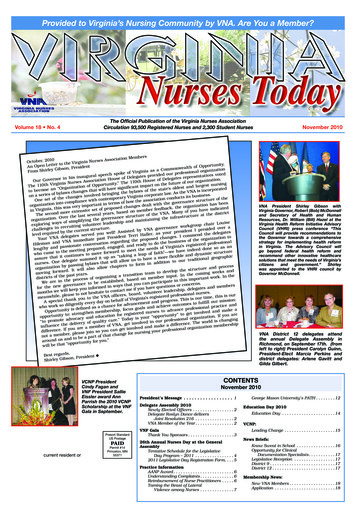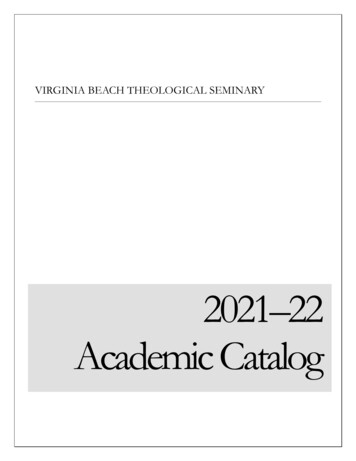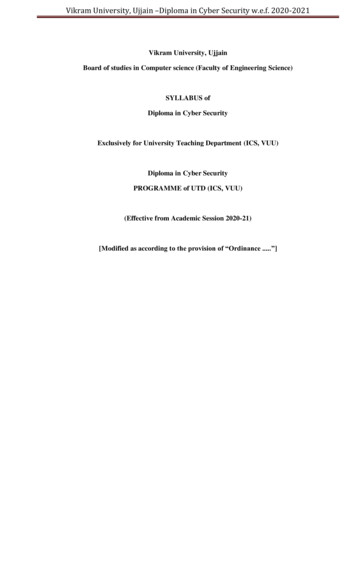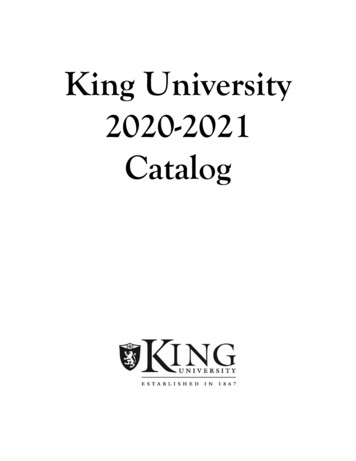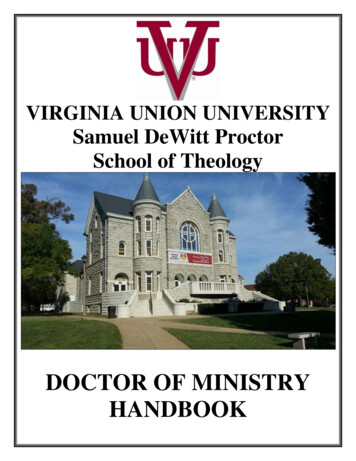
Transcription
VIRGINIA UNION UNIVERSITYSamuel DeWitt ProctorSchool of TheologyDOCTOR OF MINISTRYHANDBOOK
SAMUEL DEWITT PROCTOR SCHOOL OF THEOLOGYVIRGINIA UNION UNIVERSITYAccredited Member:Association of Theological Schools in theUnited States and CanadaSouthern Association ofColleges and Secondary SchoolsThe University is a Member of theUnited Negro College FundThe School of Theology is a member of theRichmond Theological ConsortiumThe School of Theology is a member of theWashington Theological ConsortiumThe School of Theology of Virginia Union University does not discriminate on the basis of race, sex, color,religion, national origin, age, disability, or veteran status in providing educational or employmentopportunities or benefits.Rights reserved: The School of Theology of Virginia Union University reserves the right to change theinformation, regulations, requirements, and procedures announced in this handbook.2Samuel DeWitt Proctor School of TheologyDoctoral Handbook 2016-19
DOCTOR OF MINISTRY PROGRAMSTAFF AND FACULTYDean, School of TheologyJohn W. Kinney, PhDDirector, Doctor of Ministry ProgramAlison Gise Johnson, PhDDMin Program AssociateRonda Bond, M.Ed.STVU has long enjoyed a tradition of a learned faculty comprised of persons who are qualified scholars in their respectivedisciplines. The seminary’s “adjunct” professors reinforce the strength and scope of its resident faculty. Together theirteaching perspectives and interaction with students are informed and enhanced by their participation in the life of thechurch as pastors, educators, and/or counselors.Adam L. Bond, Associate Professor of Historical StudiesJessica Young-Brown, Assistant Professor of Counseling and Practical TheologyLynne Caldwell, Instructor in Practical Theology and Director of the Edosomwan InstituteKatie G. Cannon, Adjunct Professor of Theological EthicsPatricia Gould-Champ, Assistant Professor of Practical TheologyDavid Emmanuel Goatley, Adjunct Professor of Global LeadershipJames Henry Harris, Professor of Practical TheologyMichele Jacques Early, Assistant Professor of TheologyDenise Janssen, Associate Professor of Christian EducationYung-Suk Kim, Associate Professor of New Testament & Early ChristianityJohn William Kinney, Dean and Professor of Theology and Historical StudiesRay McKenzie, Coordinator –Instructor of Practical TheologyJerome Clayton Ross, Adjunct Professor of Old Testament and HebrewBoykin Sanders, Professor of New Testament Studies and GreekHarry Simmons, Assistant Professor of Pastoral CareSylvester Smith, Assistant Professor of Interdisciplinary StudiesRobert Wafawanaka, Associate Professor of Biblical StudiesNathaniel West, Assistant Professor of Christian EducationMary Young, Director of the MACE Program and Assistant Professor of Christian EducationVIRGINIA UNION UNIVERSITYSAMUEL DEWITT PROCTOR SCHOOL OF THEOLOGY1500 North Lombardy StreetRichmond, Virginia 23220University Website: www.vuu.edu(804) 257-5715 (main office)(804) 354-5920 (Doctor of Ministry Program)Fax (804) 342-39113Samuel DeWitt Proctor School of TheologyDoctoral Handbook 2016-19
TABLE OF CONTENTSMISSION STATEMENT . .5INTRODUCTION. .6PROGRAM CONCENTRATIONS . 6ADMISSION TO THE PROGRAM. .7STUDENTS WITH DISABILITIES . .7FIVE-FOLD PROGRAM PURPOSE . .7FOUR-FOLD PROGRAM SCOPE. .8PROGRAM OUTLINE AND CALENDAR. .9TUITION CHARGES. .10PROGRAM REQUIREMENTS . .11RESOURCES FOR DOCTORAL EDUCATIONCOLLOQUIUM ONEONLINE COURSE #1 – Theoretical Foundations for MinistryCOLLOQUIUM TWOONLINE COURSE #2 – Resources for Doctoral Research MethodsCOLLOQUIUM THREEONLINE COURSE #3 – Religion & Society: Interdisciplinary ConversationsCOLLOQUIUM FOURCONSULTATION WITH ADVISORTHE PROJECT/DOCUMENTTHE INSTITUTIONAL REVIEW BOARD FOR WORK WITH HUMAN SUBJECTS (IRB)CONTEXTUAL ASSOCIATES COMMITTEE .14STUDENT CLASSIFICATIONS. .15GRADING POLICY. .15INCOMPLETE POLICYGRADING SYSTEMDROP PROCEDURESPOLICY FOR RETURNING STUDENTSDOCTORAL EARLY ALERT REQUIREMENTS PROGRAM (DEAR)HONOR STATEMENTAPPEALING A PROGRAM DECISIONPROGRAM EVALUATION PROCEDURES . .18LIBRARY RESOURCES. .19APPENDIX: ADMINISTRATIVE FORMS4Samuel DeWitt Proctor School of TheologyDoctoral Handbook 2016-19
MISSION STATEMENTThe Samuel DeWitt Proctor School of Theology of Virginia Union University (STVU) is a historically African Americaninstitution that in partnership with the church and community endeavors to equip students for service within diverse,social contexts through a curriculum that emphasizes academic excellence, spiritual (trans) formation, and faithful servicein the church and world.In fulfillment of its mission, STVU seeks:(1) To act as a catalyst for the critical and conscientious faith development of students.(2) To assist students in defining and developing the specifics of their service in ministry.(3) To provide a compassionate and nurturing context for substantive theological study.(4) To serve as a facilitator of the church in defining and identifying worship in its broader aspects and inunderstanding its mission as it affects everyday life.Committed to its historic mission and compelled by present obligation to nurture leadership for the African-American andlarger communities, STVU offers an educational experience that fosters the development of church leaders who arepersonally concerned and theologically informed enough to develop capabilities for articulating visions and implementingstrategies for a just and sustainable future. The learning environment at STVU enables students to integrate thinking,feeling, and acting, as they seek to develop informed, imaginative, and consecrated ministries.The program requires that students demonstrate a clear and broad understanding of the Christian story and the capacity tointerpret critically and creatively and to communicate effectively that story. Reflection merges with action, as students areexpected to translate the Christian story, relate it to contemporary religious and global issues, and appropriate that storyand faith in a manner that enables personal and social transformation.The curriculum includes diverse offerings in the biblical, historical, theological, and pastoral fields as well asinterdisciplinary studies. STVU takes seriously the impact of the African-American experience, as it relates to biblicalinterpretation, theological construction, historical analysis, ethical action, and the role and character of ministry.Employing the historical Trans-Atlantic Middle Passage as the guiding focus for theological study in conjunction withacknowledging the uniqueness of students, STVU seeks to discern and respond to the unfolding of God’s truth in itsmultidimensional forms. The curriculum is classical and innovative, structured and flexible, traditional and contemporary.Within the style, life, and curriculum of STVU, students from any ethnic background and culture can find a highlyrelevant approach to the preparation for Christian ministry.5Samuel DeWitt Proctor School of TheologyDoctoral Handbook 2016-19
INTRODUCTIONConsistent with the mission of the school to provide expanding opportunities for equipping persons in fulfilling their callto service in the church, STVU offers a Doctor of Ministry Program. The Doctor of Ministry program focuses onpersonal and cultural realism in ministry; therefore, the program is generally described as Ministry in Cultural Context. Itrecognizes the unique and special contributions that each cultural context provides for the church at large. Moreover, thereis the recognition that persons are best prepared to serve the world when there is an awareness of the particulars of one'sown culture. The ultimate goal is to prepare the laity to understand and to embody their unique gifts as persons andgroups, in order to share those gifts in a pluralistic society.Because the nature of the program relates so closely to the constituency of the church or ministry context, the applicantshould be able to demonstrate the position of his or her engagement with the church/context for the period of the program.PROGRAM CONCENTRATIONSThe Doctor of Ministry Program periodically identifies areas of concentration focused on addressing concerns affectingcommunities based on changing social, economic and political landscapes. Students participating in the concentrationsmay develop ministry research projects informed by individual interests and/or collaborative efforts. Currently, theDoctor of Ministry Program has identified the following areas of concentration: Community Health and Sustainability - An agency collaborative interdisciplinary concentration focused ondeveloping sustainable ministries related to community health and sustainability. Particular attention is given tothe interconnectedness of theological formation, socio-economic stability, sustainable health practices (physical,emotional, mental, intellectual and nutritional), and policies governing such. Students should projects bedesigned to develop substantive replicable resources potentially formed by agency collaborations for the purposerebuilding and stabilizing families and communities. Global Leadership and Institutional Reform - A rigorous inter-contextual study of the intersection of missions,liberation theologies and global leadership formation. Particular attention is given to the inextricable nature oftheological formation, justice-oriented missions, institutional viability and community sustainability. Studentprojects should represent commitment to excavation and distribution of intellectual resources informing theoryand praxis. Preaching and Social Concern - Rooted historically in the traditions of liberation preaching, a rigorousinterdisciplinary and inter-textual approach to the substance and form of preaching. Particular attention is givento the inextricable nature of individual transformation and efforts toward community mobilization andsustainability by addressing practical and theoretical issues ranging from the study of rhetoric to analysis of socialcontext Worship and the Creative Arts - A rigorous interdisciplinary program designed for ministerial leaderscommitted to substantive study and interface of theology, ethics and performing/fine arts. Particular attention isgiven to the inextricable nature of cultural productions as means of religious, moral and theological tutoring.Student research to evince commitments to translating movement and media into resources informing theory,praxis and sustainability of artistic expressions as essential to faith and community building. Youth and Young Adult Engagement - A cross-generational engagement in theory and praxis of the centralityof nurturing youth and young adult in the faith inclusive of personal integrity and participation in social justicemovements. Particular attention is given to the inextricable nature of theological formation, historical andbiblical foundations informing sustainable transformation committed to developing trans-continental research andconversations among youth and young adults in order to develop relevant repositories of methods and outcomesfor sustainable faith-based social action.6Samuel DeWitt Proctor School of TheologyDoctoral Handbook 2016-19
ADMISSION TO THE PROGRAMAdmission to the ProgramThe Doctor of Ministry Program is open, without discrimination, to applicants who have completed the Master of Divinity(M. Div.) degree at an ATS accredited seminary, provided the applicant has been engaged in professional churchrelated/other ministry for at least three (3) years subsequent to receiving the M. Div. degree, and provided the applicanthas demonstrated the ability to do academic work at the graduate level. The demonstration of such ability will beevidenced by a grade of B or better, demonstrated quality in communication skills, and cognitive ability as ascertained ina review of the application packet. For admission deadlines, please visit www.vuu.edu.Admission of Transfer StudentsThose who were doctoral students in an ATS accredited institution may apply for admission. Once the full application issubmitted, it is referred to the Doctor of Ministry Committee to determine eligibility of admission. Once admission isconfirmed, credits and coursework from previous institution are evaluated to determine equivalency to STVU DMindegree requirements. Once transferability of courses and course work is evaluated and established, the application issubmitted to the DMin Admissions Committee for approval. Upon acceptance, the student's stage of entrance, in relationto the STVU program, is configured and the student enters the program in the appropriate semester. The date of entry is atthe discretion of the Committee and is dependent upon program capacity.STUDENTS WITH DISABILITIESDisability Services: Section 504 of the Rehabilitation Act of 1973 and the Americans with Disabilities Act of 1990require the University to provide academic adjustments and/or accommodations for students with documented disabilities.Students seeking academic adjustments or accommodations must self identify with the Coordinator of Services forStudents with Disabilities, at 804-342-3885 (The Center for Student Success and Retention, Ellison Hall, Room 117).After meeting with the Coordinator, students are encouraged to meet with their instructors to discuss their needs and ifapplicable, any lab safety concerns related to their disabilities.FIVE-FOLD PROGRAM PURPOSEThe specific purpose of the program is to accomplish the following: TO EMPOWER the professional minister for the task of enhancing the spiritual growth, wholeness andleadership skills of the laity with whom they serve. TO EQUIP the minister with leadership skills to enable others to better serve. Particular attention is given to theimpact of cultural contexts on the styles and methods of ministry. TO ENHANCE communication, writing and speaking skills. Students will apply these skills to their variouscultural traditions and empower new contributions concerning the understanding of ministry worthy of sharing in,and between various groups that constitute the church at large. TO ESTABLISH models for addressing unique needs within and between ethnic and cultural groups ascongregations and constituencies. Such models become the Project Document of each candidate. Participation inthe group process is mandatory and familiarizes all members of the cohorts with the unique contribution of eachparticipant. TO ENGAGE students in collaborative research with colleagues, community practitioners and scholars whereinprojects are intentionally designed to respond to larger-community, global and societal needs.7Samuel DeWitt Proctor School of TheologyDoctoral Handbook 2016-19
FOUR-FOLD PROGRAM SCOPE A disciplined self-appraisal of the participant's role as an individual, family member, and professional. A secondary gainof disciplined sharing in this area is the development of trust and openness for enrichment and to promote healingresources. An in-depth review and refinement of the participant's understanding of the context and current applicability oftraditional theological disciplines, especially biblical, theological, historical, and ethical studies, particularly as they relateto the participant's perspective for future ministry. A rigorous dialogical process in the colloquia and doctoral courses, requiring complete and thoughtful preparation,creative analysis and interdisciplinary correlation of ideas and applications. A constant focus on two areas that are critical for effectiveness: (a) handling the intellectual data and criteria and (b)understanding of the cultural parameters, which govern the study.8Samuel DeWitt Proctor School of TheologyDoctoral Handbook 2016-19
PROGRAM OUTLINE AND CALENDARCourse ID#Course TitleSemesterGradeCOMMENTSYear OneDM601Resources for DoctoralEducationFallCourse begins online July 1st; 3-dayorientation residency requirement inSeptember.CON605Doctoral Consultation1FallDeadline for Fall assignments – November 15thDM602Colloquium ISpringThis course has a Jan. residency requirementCON606Doctoral ConsultationSpringDM711Theoretical Foundations for SpringOnline courseMinistryContextual Associate FormsSpringSigned forms must be on file April 1stDeadline for Spring assignments – April 30thYear TwoDM603CON607Colloquium IIDoctoral ConsultationFallFallThis course has a July residency requirementDM712Resources for DoctoralFallOnline courseResearch MethodsCandidacy Application and I.R.B.2 Application FallDeadline December 1st for both applicationsDeadline for Fall assignments – November 15thDM604CON608DM713Colloquium IIIDoctoral ConsultationTransforming Community,Reforming InstitutionsCandidacy Proposal PresentationSpringSpringSpringThis course has a Jan. residency requirementOnline courseSpringDeadline for Spring assignments – April 30thYear ThreeDM605CON609DM608CON610DoctoralColloquium IVFallThis course has a July residency requirementDoctoral ConsultationFallDeadline for Project/Document Chapters – November 15thProject/DocumentSpringFinal Residency – Doctoral DefenseDoctoral ConsultationDefense3SpringSpringDeadline for Final Edits & ProQuest Submission –April 15thTotal credits - 62Doctoral students must maintain a 3.0 Cumulative GPA.1Consultations Courses (CON) are administered online during which students develop and submit for review all non-courseworkrequirements of the program (e.g., Contextual Associate Forms, IRB Application, Candidacy, etc.) These courses also include groupand individual advisement.2Institutional Review Board for Human Subject Research; students are not able to move forward without successfully completing thisprocess.3Students must successfully defend their Project/Document in order to participate in the Spring Commencement.9Samuel DeWitt Proctor School of TheologyDoctoral Handbook 2016-19
2017-19 TUITION CHARGES( 256.00 per quarter hour)Semester 1: July 1 - November 15thSemester 2: December 1 – April 30thFIRST ACADEMIC YEARSemesterCourseHoursCostOrientation (ORI 601) and Research Course10FallDMIN Consultation (CON 605)2Colloquium I (DM 602)5SpringDoctoral Course DM7115DMIN Consultation (CON 606)2TOTAL 24SECOND ACADEMIC YEARSemesterCourseColloquium II (DM 603)FallDoctoral Course DM712DMIN Consultation (CON 607)Colloquium III (DM 604)SpringDoctoral Course DM713DMIN Consultation (CON 608)HoursCost552552TOTAL 24THIRD ACADEMIC YEARSemesterCourseColloquium IV (DM 605)FallDMIN Consultation (CON 609)Project/Document (DM 608)SpringDMIN Consultation (CON 610) 2,560.00 512.00 1,280.00 1,280.00 512.00 6,244.00 1,280.00 1,280.00 512.00 1,280.00 1,280.00 512.00 6,244.00HoursCost5252TOTAL 14PROGRAM TOTAL 62 1,280.00 512.00 1,280.00 512.00 3,584.00 16,072.00OTHER FEES: Students are charged a 200 comprehensive fee each semester. Late Registration Fee - 500 per semester; assessed with tuition. Graduation Fee - 150.00, covers all cost associated with producing the commencement ceremony. This does notinclude the cost of the doctoral regalia; please estimate 600 - 800 for your regalia purchase. There is arental option, but the rental robe will not have the same look. There is a 100 installment fee per semester for self-pay students who wish to enroll in one of the payment planoptions. Students who pay in full are not accessed this fee. Continuation Fee: 1,250 (5 credits) is assessed each semester in which a student informs the Director in writingthat s/he will not participate in the normal semester activity, but wish to remain active in study. This fee isassessed each consecutive semester until the student matriculates into their proper cohort. Global Leadership Travel Fee: 4,600 is assessed for all students enrolled in the Global LeadershipConcentration Cohort for travel abroad during the Spring Semester of the second academic year.NOTE: Tuition is assessed at the beginning of each semester: July and December. Add and Drop periods will occur atthe beginning of each semester when tuition is charged.10Samuel DeWitt Proctor School of TheologyDoctoral Handbook 2016-19
PROGRAM REQUIREMENTSUpon acceptance into the program, students will begin an online research course beginning July 1st of their acceptanceyear. In addition, there will be a three-day residency requirement held in September of the same year. After theresidency, the research course will continue through the online portal. This course will guide the student in the utilizationof research and writing techniques, as the program will require extensive use of these skills.Each participant must successfully complete four colloquia and three on-line courses over the course of the first two yearsof the program. Students are free to take additional courses – outside of the required STVU DMin curriculum – thatrelate to their project context. Doctoral students must maintain a 3.0 cumulative GPA to remain in the program. Eachcolloquium has a residency requirement (per semester) and a required online course. The Doctor of Ministry degree has a62-hour requirement. The outline of the colloquia and doctoral courses are as follows:Colloquium I – Two-Week Residency Week One:o Intensive Seminar With Guest Lecturer(s)o Group AdvisingWeek Two:o Advanced Topics in Theological StudiesBiography as TheologyPractical TheologyTheology, Ethics, and HistoryBiblical Studieso DMin Luncheono Meetings with Advisorso Concentration Cohort MeetingsDM711: On-line Course Requirement ITheoretical Foundations for Ministry – Exposes students to the breath of project design; presents introductory IRB coursematters and program writing expectations. Expected outcomes of this course – Literature Review and Research Paperoutlying student’s research.Colloquium II-One-Week Residency Week One:o Intensive Seminar With Guest Lecturer (Morning Session)o Appreciative Inquiry Method Seminar (Afternoon Session)o Group Advisingo Concentration Cohort MeetingsWeek Two:o Online IRB Courseo Project Development (Coaching for Candidacy)DM 712: On-line Course Requirement IIResources for Doctoral Research Methods - Integrates advanced topics in theological studies with ministry project focus;engages resources informing theories informing the project of the student; develops the Candidacy Proposal and outlines theProject Document. Expected outcomes – research paper defining theoretical foundations informing the project andfoundation for Candidacy Proposal PowerPoint presentation.CANDIDACY PROPOSALColloquium III – One-Week Residency
Week One:o Candidacy Presentations - (see page 24-25)o Concentration Cohort Meetings Week Two:o Begin DM713 Final Online CourseDM713: On-line Course Requirement IIIReligion and Society: Interdisciplinary Conversations – Employs ideas, theories and methods found in disciplines thatintersect project research. Expected outcomes – research paper defining methodological approaches feeding into eventualproject document.Colloquium IV – One-Week Residency Week One:o Intensive Seminar (One-Day)Publishing for Ministry Professionalso Capstone Seminar I - Context Resource Presentation; Student translation of research intoresources suitable for context and communities-at-large (Morning Session)o Advisor Consultations (Afternoon Session)o Concentration Cohort Meetings/Practicum (Travel where required) Week Two:o On-line Writing “Boot Camp”o Concentration Cohort Meetings/Practicum (Travel where required)CONSULTATION WITH ADVISOR (CON 605 - 610)During the colloquia, there are scheduled Faculty Consultation periods for which the student is responsible forparticipation in group advisement sessions and contacting the Faculty Advisor. In addition, regular consultations shouldbe held with the Advisor until the Project/Document is completed. These consultations will be devoted to providingguidance, monitoring progress and maintenance of quality work.THE PROJECT/DOCUMENT (DM 608)The Project Document will represent a model for ministry that incorporates insights from relevant theological disciplinesand should show originality, intellectual rigor, and spiritual depth. Upon the granting of candidacy, a Candidate mustcomplete all requirements for research with human subjects (forms and guidelines are available on-line and in the DMinOffice.)DMin participants begin project work and final production of the Project Document under faculty supervision. Thecandidate should submit chapters or drafts to the Advisor on a timely basis in order that the Advisor can certify itsreadiness for faculty review by as early as the Fall semester of the third year with a final deadline of February 1st of thestudent’s third and final year. If necessary, to facilitate the submission of a document ready for defense, a student maysecure competent editorial assistance. Otherwise, a professional editor must be engaged for final editing prior to binding.The Project Document is expected to reflect the benefits of experience gained in ministry based on action, reflection,observation, and disciplined research. It is also expected to make a contribution to the understanding of ministry in aparticular cultural context and/or in the church and/or community at large.While it is difficult to pre-determine the length of the Project/Document, as this may vary from candidate to candidate, theexpected range is 100 – 150 pages; not including appendices.12Samuel DeWitt Proctor School of TheologyDoctoral Handbook 2016-19
DEFENSE OF THE PROJECT/DOCUMENTOnce the Advisor verifies that the Project/Document is ready for faculty review, they will appoint an examiningcommittee. This committee consists of the Advisor and two faculty readers. In addition, a member of the ContextualAssociates Committee is selected by the Candidate to take part in the Defense process.After a discussion of the Project/Document with the candidate, the Examining Committee will make a judgment relativeto the candidate’s personal growth, content of the defense, presentation skills and the quality of the Project/Document.This judgment is recorded on Defense Evaluation form (see page 36). In addition, the committee will complete theGranting of Degree form; this form explains the judgements of the committee concerning the Project/Document and therecommendation on conferring the degree.The final copy of the Project/Document will be sent electronically through ProQuest . Instructions and cost for thisprocess can be found in the Doctor of Ministry Program office and through our Theological Librarian. See page 33 for fullinstructions.INSTITUTIONAL REVIEW BOARD POLICYVirginia Union University (VUU) is responsible for safeguarding the rights and welfare of human subjects involved inresearch activities. Any project originating at VUU, which uses human subjects, including self-experimentation, is subjectto review and approval by the Institutional Review Board (IRB) for the Protection of Human Subjects. Studies may notbegin until an IRB review process is fully executed and the protocol is approved by the members of the IRB. If a researchproject is to be done at an institution other than VUU, the Principal Investigator (PI) must follow that institution’s IRBprocess.Certification that the project is approved by the IRB will be given to the PI. Consent to participate will be documented bythe use of a written consent form approved by the IRB and signed by the PI and/or his/her representative.The IRB may impose additional conditions prior to, or at the time of, approval when, in the judgment of the IRB,additional conditions are necessary for the protection of the human subjects. (Code of Federal Regulations, Title 45 PublicWelfare, Department of Health and Human Services, Part 46 Protection of Human Subjects, Subpart sections 46.101 46.409 B REVIEW AND APPROVAL IS REQUIRED PRIOR TO INITIATING ANY RESEARCH INVOLVING HUMANPARTICIPANTS!Virginia Union University assures that it will apply Title 45 Code of Federal Regulations Part 46(http://ohsr.od.nih.gov/guidelines/45cfr46.html) and all of its subparts to all research involving human subjects:A: General adult population;B: Additional protections for pregnant women, human fetuses and neonates;C: Additional protections for prisoners;D: Additional protections for children.VUU’s IRB will report to the Vice-President of Academic Affairs. Students will begin this process with an online coursein the Fall semester of their second year with an application deadline of December 1st.13Samuel DeWitt Proctor School of TheologyDoctoral Handbook 2016-19
CONTEXTUAL ASSOCIATES COMMITTEEOne of the guiding assumptions of the DMin program at Virginia Union is that ministry must be grounded in a culturalcontext. A significant aspect of a person's ministry involves the persons with whom one interacts and persons who areserved in a ministry. A
The School of Theology of Virginia Union University does not discriminate on the basis of race, sex, color, religion, national origin, age, disability, or veteran status in providing educational or employment . University Website: www.vuu.edu (804) 257-5715 (main office) (804) 354-5920 (Doctor of Ministry Program) Fax (804) 342-3911 .
